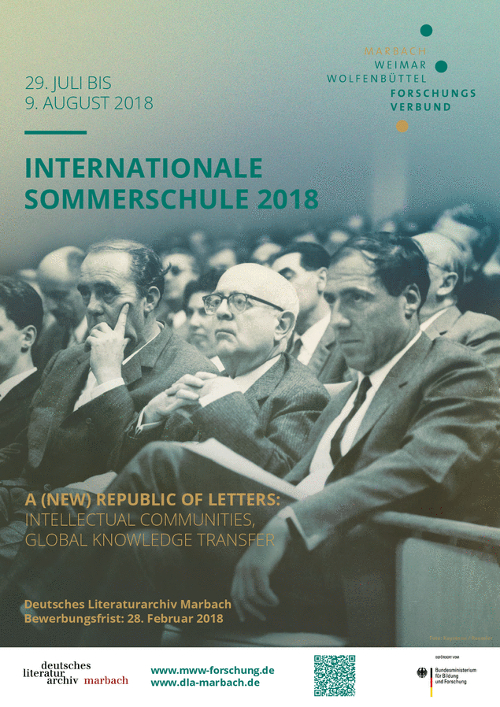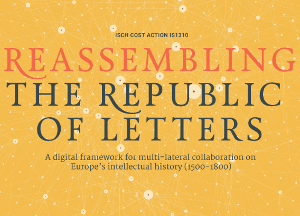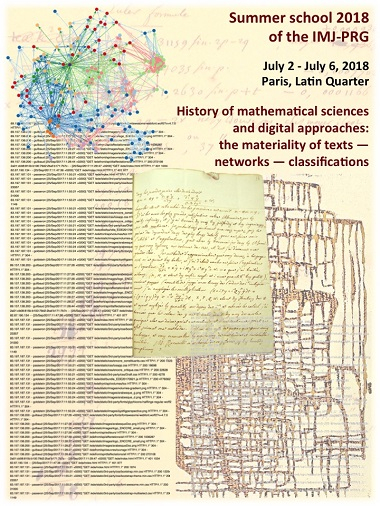As institutions and academics projects announce details of this year’s educational schemes and courses, users of EMLO and followers of the research being conducted at Cultures of Knowledge may be interested to learn of a summer school that will focus upon republics ― note plural ― of letters both past and present as (to reuse an extract from the title of Anthony Grafton’s 2009 publication) ‘worlds made by words’.[1. Anthony Grafton, Worlds Made by Words: Scholarship and Community in the Modern West (Harvard University Press, 2009, hardback; 2011, paperback).] This summer school, A (New) Republic of Letters: Intellectual Communities, Global Knowledge Transfer, will be hosted by the German Literature Archive Marbach and will run between 29 July and 9 August.
 Twenty international scholarships are available and doctoral students will be invited to explore and discuss the ‘phenomenon of the Republic of Letters, its historical and theoretical manifestations, and the terminological challenges it poses’. They will be encouraged to consider such questions as the aesthetic, political, and social conditions upon which networks for knowledge exchange are built; to ask what rules and customs those communicating with each other observe; as well as to explore the transformations these communities undergo, and determine terminology and methods that might be employed to describe today’s ‘literary and intellectual landscape on a transnational scale’ ― a landscape itself now termed a ‘New Republic of Letters’ .[2. Jerome McGann, A New Republic of Letters. Memory and Scholarship in the Age of Digital Reproduction (Harvard University Press, 2014).] ‘The investigation into the structures of communication between intellectuals lies at the focus of the Summer School. Their exchange regarding scientific, political and social issues will be explored as it developed in the eighteenth and nineteenth centuries through letter exchanges, academic journals, periodicals, and the intellectual life in salons. The changes in the twentieth and twenty-first centuries by new inventions in technology and in the media will be an object of investigation, just as the introduction of the World Wide Web and its effect on academic collaboration and communication. The discussions thus address challenges research faces today by linking them back to our handling of digital storage of large volumes of data in academia.'[3. See the announcement released describing the summer school: A (New) Republic of Letters: Intellectual Communities, Global Knowledge Transfer International Summer School (Marbach Weimar Wolfenbüttel Research Association).] Interested? This call will remain open until 28 February and further information, including details of how to apply, may be found here.
Twenty international scholarships are available and doctoral students will be invited to explore and discuss the ‘phenomenon of the Republic of Letters, its historical and theoretical manifestations, and the terminological challenges it poses’. They will be encouraged to consider such questions as the aesthetic, political, and social conditions upon which networks for knowledge exchange are built; to ask what rules and customs those communicating with each other observe; as well as to explore the transformations these communities undergo, and determine terminology and methods that might be employed to describe today’s ‘literary and intellectual landscape on a transnational scale’ ― a landscape itself now termed a ‘New Republic of Letters’ .[2. Jerome McGann, A New Republic of Letters. Memory and Scholarship in the Age of Digital Reproduction (Harvard University Press, 2014).] ‘The investigation into the structures of communication between intellectuals lies at the focus of the Summer School. Their exchange regarding scientific, political and social issues will be explored as it developed in the eighteenth and nineteenth centuries through letter exchanges, academic journals, periodicals, and the intellectual life in salons. The changes in the twentieth and twenty-first centuries by new inventions in technology and in the media will be an object of investigation, just as the introduction of the World Wide Web and its effect on academic collaboration and communication. The discussions thus address challenges research faces today by linking them back to our handling of digital storage of large volumes of data in academia.'[3. See the announcement released describing the summer school: A (New) Republic of Letters: Intellectual Communities, Global Knowledge Transfer International Summer School (Marbach Weimar Wolfenbüttel Research Association).] Interested? This call will remain open until 28 February and further information, including details of how to apply, may be found here.
And whilst considering communities, knowledge, its transfer, and the symmetry of today’s scholars of intellectual history who with their own networks mirror those of their forebears, it is worth noting that members of the COST-funded action Reassembling the Republic of Letters are gathering next week at a conference ― Publishing the Digital Republic of Letters: Systems, standards, scholarship in the context of an enhanced publication ― in Valletta, Malta, to discuss how best to align current research, digital tools, and infrastructure. Should you be interested and not able to attend, it would be worth keeping an eye on the Action’s website and the updates that emerge as the scholars and technical experts within this community continue to explore the works and connections of their early modern counterparts. The Action’s publication, currently in preparation and the subject of focussed discussion in Valletta, will appear later in the year. Details (I’ve no doubt many) to follow …

 in Tallinn, this four-day workshop offers those who focus on early modern correspondence the opportunity to prepare epistolary metadata using tools that will both assist their own research and facilitate publication in a union catalogue. Early career scholars, representatives from institutions with large holdings of early modern correspondence, and individuals interested in disseminating further the taught epistolary standards, techniques, and tools within their scholarly communities are encouraged to apply. Whilst applications are welcomed from scholars in all countries participating in the COST Action, the Training School is funded by an ‘Inclusiveness and Target Countries’ grant, so scholars from these countries are encouraged in particular to apply (further details regarding this may be found in the original call).
in Tallinn, this four-day workshop offers those who focus on early modern correspondence the opportunity to prepare epistolary metadata using tools that will both assist their own research and facilitate publication in a union catalogue. Early career scholars, representatives from institutions with large holdings of early modern correspondence, and individuals interested in disseminating further the taught epistolary standards, techniques, and tools within their scholarly communities are encouraged to apply. Whilst applications are welcomed from scholars in all countries participating in the COST Action, the Training School is funded by an ‘Inclusiveness and Target Countries’ grant, so scholars from these countries are encouraged in particular to apply (further details regarding this may be found in the original call). Thereafter, mathematical historians, historians of science, and digital humanists may be interested in the International Summer School being organized by the
Thereafter, mathematical historians, historians of science, and digital humanists may be interested in the International Summer School being organized by the